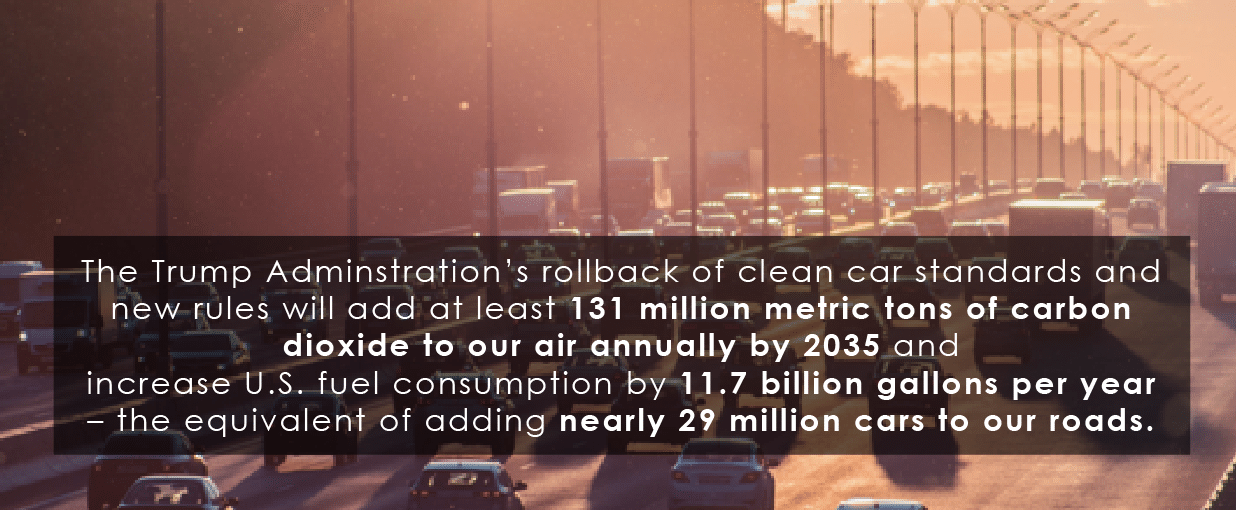This blog was written by Jennifer Rennicks, former Senior Director of Policy & Communications at the Southern Alliance for Clean Energy.
Guest Blog | May 28, 2020 | Clean Transportation, Electric Vehicles, Energy Policy
Back in late March, just as attention was focused on the ballooning health crisis resulting from the rapid spread of the novel coronavirus, the Trump Administration announced a rollback of the clean car standards: national regulations and incentives designed to save consumers money, reduce transportation pollution, and spur climate-friendly automotive innovation.
We blogged about the short-sighted rule that now requires cars and light trucks to improve vehicle efficiency by only 1.5% annually between 2021 and 2026 versus the nearly 5% annual efficiency improvements established under the initial Clean Car Standard in 2012, and we highlighted that flawed science and manipulated data was undoubtedly driving this decision.
New evidence has surfaced showing that the Trump Administration did in fact ignore direct warnings from career EPA officials who said the rule had serious flaws according to documents obtained by U.S. Senator Thomas R. Carper (Del.), the top Democrat on the Environment and Public Works Committee.
According to a story by the Washington Post, “the documents reveal that EPA staff were sidelined as they warned that the revised standards had several defects.” In response to these revelations, Sen. Carper noted:
Autoworker Impact
Back in April, we cautioned against implementing a new rule that would cost jobs when even the Trump administration’s own analysis concluded that the rollback will eliminate 13,500 autoworker jobs. [The whole report is here and a table on page 1,721 shows that the policy will actually lead to 13,474 fewer jobs compared with the existing Obama-era standards.]
At the start of April, nearly 17,000,000 Americans had filed for unemployment, and today that number has more than doubled as experts warn the next unemployment report may show nearly 41,000,000 Americans have filed claims in the last ten weeks.
In April we warned that experts predict the unemployment rate could top or equal what we saw in the Great Depression, so enacting a policy that expects further cut jobs made no sense then and makes even less sense today.
Public Health Impact
And early last month we warned this new policy would undermine public health at the height of a public health crisis as the government’s own analysis of the “so-called” Safer Affordable Fuel-Efficient Vehicles rule shows there will be adverse public health impacts from these weaker standards. For example, the Union of Concerned Scientists points to the Trump administration’s own analysis which suggests upwards of 1,444 premature deaths from air pollution could result from these new rules.
While our nation confronts the challenges of a virus that attacks the respiratory system, and while 40% of citizens live in communities where unhealthy air makes it more difficult to breathe, the Trump administration is making America’s air dirtier and further compromising Americans’ health.
Time to Act
The warnings from EPA staff could create legal problems for the administration’s Safer Affordable Fuel-Efficient (SAFE) Vehicles rule, and we remain confident that the ironically-named ‘SAFE’ Vehicle Rule will end up being challenged in the courts. There’s still a chance to stall this rollback and we invite you to join the League of Conservation Voters in Tweeting to automakers to commit to maintaining the Clean Car Standards.
We also invite you to stay informed about our efforts to educate and empower individuals, communities, municipalities, policymakers, and utilities to transition to clean, electric transportation throughout the Southeast. Visit Electrify the South.org to learn more or join our monthly clean transportation newsletter here.